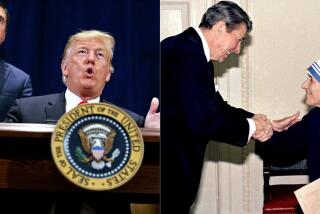The Times Poll : Reagan Enters New Term Backed by 68% of Public
Despite dwindling public support for his military buildup and efforts to cut social programs, President Reagan enters his new term in office on the crest of a job approval rating second only to the extraordinary rating he received after an assassination attempt in 1981, according to the latest Los Angeles Times Poll.
The nationwide poll of voting-age Americans, taken at a time when Reagan was basking in the glow of his second inauguration and of reports of high growth with low inflation in the nation’s economy, gave the President a 68% approval rating--the highest he has garnered since 80% in April, 1981.
A majority of Democrats as well as an overwhelming proportion of Republicans approve of the way that Reagan is handling his job. Among Democrats, he received a 53% approval rating, while 9 out of every 10 GOP voters endorsed his performance in office. More than two-thirds of all independents also registered approval.
Presidents traditionally enjoy high job ratings at the outset of second terms. But this strong public approval also tends to dissipate quickly as the euphoria surrounding the inauguration period gives way to hard political realities.
In fact, the latest Times poll shows that there may be pitfalls ahead as Reagan suits up to sell his proposals to Congress and the public. For example, the margin of approval for his handling of the federal budget is only 10 percentage points (50% approval vs. 40% disapproval), and support has eroded for two key components of his legislative program: a massive defense buildup and deep cutbacks in social programs.
Reagan’s plan to increase the Pentagon budget is now endorsed by a bare majority of 52% of the public, a sharp drop from the high of 77% early in his first year in office. As for his proposals to reduce federal spending for social services, just slightly more than one-third of those surveyed said that they approve, while 57% registered disapproval, an almost exact reversal of public sentiment four years ago.
The public also is highly skeptical about Reagan’s ability to cut taxes in his second term. The Treasury Department has introduced a plan to simplify the tax system through a modified “flat-tax” structure. Proponents contend that more than half of all individual taxpayers would receive a tax cut under the new proposal.
By 58% to 32%, however, respondents to the poll said they do not believe the President will be able to make major reductions in federal taxes, compared to the 65% to 27% ratio in the other direction in early 1981.
Nevertheless, 54% approve of the way Reagan is handling taxes, which amounts to an endorsement of the three-year, 25% cut in taxes enacted during his first year in office and his fierce opposition since then to raising taxes, even in the face of record high federal deficits.
Ironically enough, Reagan’s strongest public support is for an Administration goal that has remained on the back burner since the collapse of the ill-fated “new federalism” drive in 1982: giving more power to state and local governments.
Seventy-nine percent of those surveyed approve of the President’s proposals to return more authority to state and local governments, compared to only 15% who disapprove--a ratio that has remained virtually unchanged since Reagan first took office in 1981.
The latest poll also shows solid support for his handling of the economy, with 63% approving and 32% disapproving. Moreover, despite the alarms sounded over the threat to continued economic recovery from the widening federal deficit, the poll disclosed a confidence that Reagan will be able to make U.S. industry more productive and cut unemployment even further during his second term.
Reagan also won high marks for his management of foreign affairs, with 59% approving and 27% disapproving, his best rating in the last two years.
By a ratio of 5 to 1, voters believe that he will keep America at peace during his second term. That is a much stronger showing than he has made in past Times surveys, which were taken before the recent U.S.-Soviet agreement to resume arms control talks.
A majority of respondents also believe that Reagan will make the United States stronger militarily than the Soviet Union. However, on the minus side of the President’s foreign policy report card, most think that he will not be able to halt the spread of Soviet influence around the world.
The poll, conducted by Times Poll Director I.A. Lewis, surveyed a scientific cross section of 1,847 voting-age Americans from Jan. 19-24 by telephone and has a margin of error of 3 percentage points in either direction.
More to Read
Get the L.A. Times Politics newsletter
Deeply reported insights into legislation, politics and policy from Sacramento, Washington and beyond. In your inbox three times per week.
You may occasionally receive promotional content from the Los Angeles Times.









